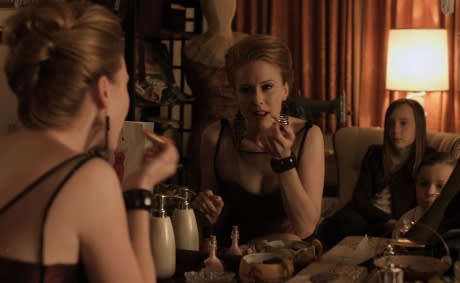It's difficult for a child to recognize when a parent is a destructive role model. We're hardwired as a species to trust our biological caregivers implicitly, but there comes a time when a young mind begins to comprehend moral uncertainty and must choose whether to follow the suspect behaviour patterns unconsciously being taught, or listen to the voice of objective reasoning innate to each of us.
Set in the 1960s, Winnipeg-based writer/director Shelagh Carter's Passionflower follows the confusing journey of young Sarah Matthews as she begins to process the increasingly erratic actions of her mother, Beatrice (Kristen Harris). A trophy wife, of sorts, the vampy redhead is prone to manic-depressive fits, which usually follow an evening of inappropriate aggressively flirtatious behaviour.
When she's not screaming and crying on the floor, Beatrice is completely obsessed with her physical appearance and derives her sense of self-worth by enforcing the perception that she's a potent sexual object to anyone who'll pay her mind. In her tunnel vision of self-interest, Beatrice neglects Sarah, showing more concern for how her daughter is dressed than the girl's obvious artistic talent and excellent grades in school.
With a father always preoccupied by work and a little brother too young to do anything but cling to mommy's infallibility, Sarah forms a friendship with a boy at school who shares her passion for art and her mother's obsession with the beauty of the female form. As suggested by the opening scene, in which Sarah takes a shortcut through a patch of dark forest to make her way home, the young girl explores the greedy and manipulative side of her mother's illness, fearing that the bipolar disorder affecting her mother and grandmother is an inevitability that will claim her too.
Carter employs a lot of low camera angles to enforce the perspective of a child looking up to her parents but otherwise utilizes a simple unobtrusive shooting style that lets the strong performances (especially by the fearless Harris) do the talking.
This low-key character piece leaves a bit much unexplained, failing to explore why Beatrice's bipolar outbursts manifest as desperate sexuality, leaving things very open-ended, but it's still a worthwhile look at the scary journey of recognizing morally abject behaviour in the one person a child is supposed to be able to trust.
Passionflower screens at the TIFF Bell Lightbox on Wednesday, November 14th, 2012, at 6:30pm.
(Passionflower Films)Set in the 1960s, Winnipeg-based writer/director Shelagh Carter's Passionflower follows the confusing journey of young Sarah Matthews as she begins to process the increasingly erratic actions of her mother, Beatrice (Kristen Harris). A trophy wife, of sorts, the vampy redhead is prone to manic-depressive fits, which usually follow an evening of inappropriate aggressively flirtatious behaviour.
When she's not screaming and crying on the floor, Beatrice is completely obsessed with her physical appearance and derives her sense of self-worth by enforcing the perception that she's a potent sexual object to anyone who'll pay her mind. In her tunnel vision of self-interest, Beatrice neglects Sarah, showing more concern for how her daughter is dressed than the girl's obvious artistic talent and excellent grades in school.
With a father always preoccupied by work and a little brother too young to do anything but cling to mommy's infallibility, Sarah forms a friendship with a boy at school who shares her passion for art and her mother's obsession with the beauty of the female form. As suggested by the opening scene, in which Sarah takes a shortcut through a patch of dark forest to make her way home, the young girl explores the greedy and manipulative side of her mother's illness, fearing that the bipolar disorder affecting her mother and grandmother is an inevitability that will claim her too.
Carter employs a lot of low camera angles to enforce the perspective of a child looking up to her parents but otherwise utilizes a simple unobtrusive shooting style that lets the strong performances (especially by the fearless Harris) do the talking.
This low-key character piece leaves a bit much unexplained, failing to explore why Beatrice's bipolar outbursts manifest as desperate sexuality, leaving things very open-ended, but it's still a worthwhile look at the scary journey of recognizing morally abject behaviour in the one person a child is supposed to be able to trust.
Passionflower screens at the TIFF Bell Lightbox on Wednesday, November 14th, 2012, at 6:30pm.




